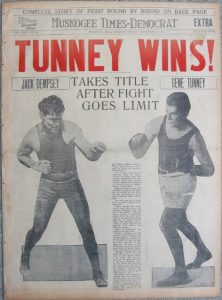Winner of the Spring 2018 StMU History Media Award for
Best Article in the Category of “Crime”
Article with the Best Introduction
In today’s society, we are taught at a young age to never speak to strangers without our parents around or by ourselves in general. However, in the late 1920s, it was a different time of danger and being more aggressive in hate crimes and violence. Sadly, those “norms” would erupt in a rise of terror and isolation within Brooklyn, New York. On February 11, 1927, two boys, Billy Gaffney and Billy Beaton, were having fun within their apartment, unsupervised. A few hours passed, both boys could not be found, until someone found Billy Beaton alone on the apartment roof. When asked where Billy Gaffney had gone, he responded with, “The boogey man took him.”1
This “boogey man” who took Billy Gaffney was indeed one’s worst nightmare. Calling him a man certainly does not do justice to the true monster that this “boogey man” Albert Fish was. At fifty-six years old, Albert Fish already had quite a life before that February day in 1927. He had been born on May 19, 1870 in Washington D.C. Originally named Hamilton Fish, Albert was the youngest of his three siblings. However, Fish had no clue as to who he would become. He was raised in a family whose members had mental health issues. His family was mostly illiterate, and to make matters worse, his own mother, when he was at the age of five, put him in an orphanage due to financial problems. Albert’s time in St. Johns Orphanage sparked a dangerous set of behaviors. He was frequently abused and beaten at the orphanage, but he soon developed something of an enjoyment of the feeling of physical pain, often giving him erections.1 In 1879, Albert’s mother was back on her feet financially and able to support Fish again. But Fish went from the abusive environment of the orphanage to a crowd of neighborhood youths who introduced the nine-year-old Fish to the practices of drinking urine, as well as to coprophagia (the act of eating feces or dung). He also started visiting public bath houses to watch young boys undress. Poor Fish’s mother had no idea that in her absence, her son was developing disturbing behaviors.
By 1890, twenty-year-old Fish had moved to New York City. In this part of Fish’s life, his behaviors escalated to rape, sodomy, and then to castration, mostly on male individuals of lower social status, such as African-American males and disadvantage males whom he believed would not be missed.3 He continued his acts of complete horror even after being arranged into a marriage in 1898 with his wife.4
During his marriage, he and his wife had six children together. He never abused his own children in any way, but he did became a house painter and usually targeted homes with young boys aged around six and continued with molestation and a morbid and horrid interest in castration.5 He was then incarcerated in 1903 for embezzlement, which then led to Fish regularly having sex with men in prison. However, his actions led to his divorce from his wife in 1917, who left him for a handyman named John Straube, and taking all of their children. That only made Fish become more sunk into a hole of obsession and terror.6 He began having morbid and frightening thoughts, and developing cravings such as cannibalism in which he enacted upon his victims in murdering them. Surprisingly, he had never been caught committing any of these murders, and if he were ever close to getting caught, he would flee the city. That is, up until Fish made a big mistake, which later helped solve the mysterious disappearance and murder of Billy Gaffney. This was possible through the unfortunately more famous case of the murder of a young girl, Grace Budd.

Grace Budd was an eleven-year-old girl who lived in a farmhouse with her brother, mother, and father. In a newspaper advertisement, Albert Fish found a man by the name of Edward Budd looking for a job. Fish then marked Edward Budd to be his next victim.7 Soon after, Fish responded to the newspaper ad by posing as a wealthy farmer named Frank Howard in need of help on his farm, and he began to be friendly with the Budd family.8 Fish’s plans, however, had switched after he discovered Edward Budd had a younger sister Grace, who seemed to be far more vulnerable than Edward had been. This is when Fish began to create a disgusting and horrible scheme to capture the young Grace Budd. Fish convinced the parents to let Grace accompany him to his sisters’ birthday party, which he completely fabricated.9 Fish took Grace and she never returned home after that day. Only after seven years, on November 11, 1934, were the details to what had happened to innocent Grace discovered. Fish sent a letter to the parents of Grace Budd detailing what he had done to her.8 To their horror, he confessed that he cooked parts of her to taste her flesh. He detailed her last moments, describing the torture and truly horrid acts Fish had committed upon her before Grace Budds’ final moments on earth. One would hope that Fish would end the letter on that horrifying and heart breaking note; however, he then described the process of preparing her body to feast upon, the parts of the body he had used, the taste of their daughters’ flesh and how he found her taste so satisfying. He then included at the end of the letter how he left her a virgin, as if that would lighten the terrible acts that he had committed on the young and innocent Grace Budd and her family.11
It was only through this tragic incident that justice came about for Albert Fish’s horrendous act of murder. Fish’s letter to the Budd family was just enough evidence to find and capture him. Detective William King helped track down and arrest Albert Fish using symbols on the stationary he used to write to the Budd family, “N.Y.P.C.B.A.” standing for “New York Private Chauffeur’s Benevolent Association.” King successfully located where it had come from, tracing it back to a room at 200 East 52nd Street from a janitor who had moved from there. This location was the exact place where Fish came frequently to receive his mail. Finally, this helped investigator William F. King pinpoint exactly where Albert Fish would be; waiting right outside of his room.12

Fish was captured and taken in for questioning. During questioning, Fish admitted to murdering Grace Budd and confessed to the investigators exactly where he had buried the remains of Grace Budd. They were able to locate Grace Budd’s bones, which were located behind Wisteria Cottage, an abandoned house in Westchester County. Fish then confessed to eating parts of Budd’s body, as well as to the murder of Billy Gaffney, including the torment he had done to Billy.8 After Fish’s arrest, he did not care for the consequences and looked very much forward to having his penalty be death. In March 1935, Fish pleaded sane but guilty.14 The court decided that he was sane, and accepted his plea of guilt.15.

Fish was executed on January 16, 1938 in the electric chair in Sing Sing Prison. Even to his death he continued his bizarre behavior, exclaiming that being electrocuted would be “the supreme thrill” of his life.9. Therefore, Albert Fish had never really suffered any consequences. Even to his death, Albert Fish took pleasure in his morbid thoughts and ultimately met the peak of his horrid obsession.
- Murderpedia: The Encyclopedia of Murderers, June 2017, s.v. “Albert Fish,” by Juan Ignacio Blanco. ↵
- Murderpedia: The Encyclopedia of Murderers, June 2017, s.v. “Albert Fish,” by Juan Ignacio Blanco. ↵
- Martin Fido, True Crime: The Infamous Villains of Modern History and Their Hideous Crimes (United Kingdom: Carlton Publishing Group, 2013), 186. ↵
- Murderpedia: The Encyclopedia of Murderers, June 2017, s.v. “Albert Fish,” by Juan Ignacio Blanco. ↵
- “Evil serial killer known as the Brooklyn Vampire who kidnapped children and cut them up and ATE them, known as the Gray Man and the Werewolf of Wisteria murderer Albert Fish was one of the most twisted serial killers,” Daily Mirror, The: Web Edition Articles (September 2017): 9. ↵
- Murderpedia: The Encyclopedia of Murderers, June 2017, s.v. “Albert Fish” by Juan Ignacio Blanco. ↵
- Murderpedia: The Encyclopedia of Murderers, June 2017, s.v. “Albert Fish,” by Juan Ignacio Blanco. ↵
- Salem Press Biographical Encyclopedia, 2017, s.v. “Albert Fish,” by Bernadette L. Bosky. ↵
- Murderpedia: The Encyclopedia of Murderers, June 2017, s.v. “Albert Fish” by Juan Ignacio Blanco. ↵
- Salem Press Biographical Encyclopedia, 2017, s.v. “Albert Fish,” by Bernadette L. Bosky. ↵
- Salem Press Biographical Encyclopedia, 2017, s.v. “Albert Fish,” by Bernadette L. Bosky. ↵
- Salem Press Biographical Encyclopedia, 2017, s.v. “Albert Fish,” by Bernadette L. Bosky. ↵
- Salem Press Biographical Encyclopedia, 2017, s.v. “Albert Fish,” by Bernadette L. Bosky. ↵
- Salem Press Biographical Encyclopedia, 2017, s.v. “Albert Fish,” by Bernadette L. Bosky. ↵
- Salem Press Encyclopedia of Science, 2013, s.v. “Irresistible impulse rule.” By Mario Morelli. ↵
- Murderpedia: The Encyclopedia of Murderers, June 2017, s.v. “Albert Fish” by Juan Ignacio Blanco. ↵



202 comments
Mariah Garcia
This was truly a hard read. Exquisitely written, the author of this piece does a great job of avoiding embellishments and conveying just how horrifying Albert Fish was. I have a pit in my stomach as I type this, as this individual truly gives me an interpretation to what “evil” is. Even the last line denoting Fish’s enjoyment of his sentence is absolutely chilling. I feel that this article, well-written and truly haunting, has given me an uneasy and untrusting demeanor for the evening.
Enrique Segovia
This article takes “morbid” to a whole new level. Albert Fish is truly one of the most gruesome and disgusting men to ever exist. His pervert behavior, ever since he was a child, sparked the monster in him that committed several atrocious murders, rapes, and cannibalistic acts. What really struck me about this story is that Fish’s odd behavior and tendencies were not controlled starting from a young age, which gave him the liberty to perform such disturbing scenes. The story of Grace and her abduction by Fish really left me astonished and fearsome of the atrocities some men can commit due to mental illness.
Donte Joseph
I usually do not like reading about gory things, but I am glad I made the exception to this article. The amount of detail allowed me to picture Albert Fish’s terrible acts and gain insight on how he thought. The fact that he did not feel bad and had no reason for what he did is terrifying and I feel that no person should experience what his victims had to.
Daniel Linstead
These kind of humans are sick. It is hard to be able to see that some human is able to do this to some other living being. This article did a good job of describing about Albert Fish. I have never ever heard of him until reading this and it has made me realize that there is some strange individuals.
Mia Stahl
Psychopathic behavior is always something of an interesting experience to read, especially when getting into the mind of a murderer. In Albert Fish’s case, it is clear to see the sick and demented things that he felt and thought. In the end, it is said that he never ultimately paid for his actions but rather was rewarded by way of electrocution. Knowing of his strange aversion towards pain lets us into his mental processes that much more. It is interesting to consider what type of punishment might have been suitable for him and which one might have delivered considerable justice to the Budd family.
Julia Deais
This is beyond crazy! Fish was a crazy guy and I can not believe they said he was sane. These acts were beyond insane. Nobody in their right mind would eat other people. I understand Fish had a bad childhood but that is no reason to resort to cannibalism. I am just so in shock that this happened and I feel so bad for the Budd family, nobody should get a note saying that some man consumed their daughter.
Lamont Traylor
I am truly disturbed and fascinated by this article at the same time because I am so shocked that someone could do something like that. As I read I assumed that he would just be kidnapping and killing children as if that was not bad enough as I continued to read he started to castrate and even eat the kids which was very strange and evil. I do not know how people like that become that way, but I wish they would not exist.
Victoria Rodriguez
Despite his abuse as a child and the violence he experienced, I wonder what aspect in his mind did he rationalize his actions? I consider myself to be on the fence about execution of criminals, but this story has me feeling that in some cases, execution is better for society. Albert Fish would not become suddenly reformed in prison and other prisoners would probably not be safe from him. In this article, with the provided details and the gory topic, you have allowed me to re-evaluate my stance on execution.
Raymond Munoz
Originally I did not think I would be interested in this article just because the main picture was so unappealing. Though, early in the article I became extremely invested through the mysterious name “boogey man”. It is story’s like this one that make me really disappointed in people, because more than one person was involved in making Fisher a monster. Ultimately, it does not matter who or how many people are to blame, all that matters is that people write amazing articles like this one to inform others so we can prevent monsters from being created.
Engelbert Madrid
I have never heard of this horrible criminal before. Albert Fish had a terrible childhood in the orphanage that he lived in; however, I can’t believe that his past would make him the monster that he lived during his adulthood. I can’t imagine how the parents of Grace Budd reacted when Fish described the horrendous things he did to their daughter. I would never understand that pain and suffering that the parents of Grace Budd went through, and I believe Albert Fish should have received a huge consequence.